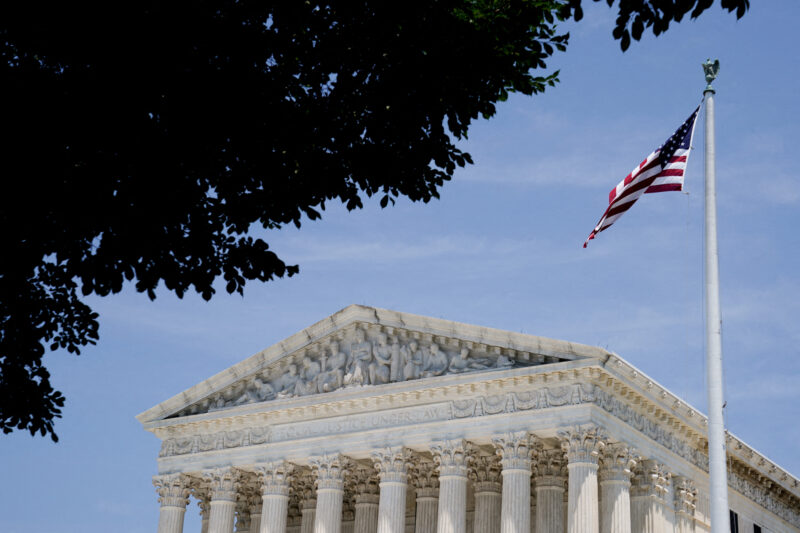The U.S. Supreme Court on Monday opens a new nine-month term, loaded with important cases on issues including race, voting rights, religious liberty, environmental regulation, the power of federal agencies and even Andy Warhol paintings.
Here is a look at some of the cases that the justices are due to hear during the term.
1. RACE-CONSCIOUS STUDENT ADMISSIONS POLICIES
A legal fight coming before the court on Oct. 31 gives its conservative majority a chance to end affirmative action admissions policies used by many colleges and universities to increase their numbers of Black and Hispanic students. A group founded by anti-affirmative action activist Edward Blum is appealing lower court rulings that upheld race-conscious admissions programs at Harvard University and the University of North Carolina. Blum’s group accused the schools of discriminating against applicants on the basis of race in violation of federal law or the U.S. Constitution. The schools have said they use race as only one factor in a host of individualized evaluations for admission without quotas to promote campus diversity.
2. VOTING RIGHTS ACT
The justices next Tuesday are set to hear arguments in an Alabama case that threatens to cripple a landmark civil rights law – the Voting Rights Act, which bars racial discrimination in voting. Alabama is appealing a lower court’s ruling invalidating a map approved by the state’s Republican-controlled legislature drawing the boundaries of the state’s seven U.S. House of Representatives districts. The lower court found that this map diluted the electoral clout of Black voters in violation of the Voting Rights Act. The map concentrated Black voting power in the state into a single district even though Alabama’s population is 27% Black.
3. JUDICIAL OVERSIGHT OF ELECTION LAW
The justices will hear a Republican-backed appeal in a case from North Carolina that could give state legislatures far more power over federal elections by limiting the ability of state courts to review their actions. North Carolina’s top court threw out a map approved by the Republican-controlled state legislature delineating the state’s 14 U.S. House districts. That court determined that the districts were drawn impermissibly in a manner that boosted electoral chances of Republicans at the expense of Democrats. The Republican lawmakers in the case are invoking a contentious legal theory called the “independent state legislature doctrine” that holds that the Constitution gives legislatures, not state courts or other entities, authority over election rules including the drawing of electoral districts. An argument date is pending.
4. RELIGIOUS RIGHTS VS. LGBT RIGHTS
A major new legal fight pitting religious beliefs against LGBT rights is headed to the justices. The case involves an evangelical Christian web designer’s free speech claim that she cannot be forced under a Colorado anti-discrimination law to produce websites for same-sex marriages. A lower court rejected business owner Lorie Smith’s bid for an exemption from a Colorado law barring discrimination based on sexual orientation and certain other factors. An argument date is pending.
5. NATIVE AMERICAN ADOPTION LAW
The justices on Nov. 9 will hear a dispute over the legality of federal requirements giving Native American families priority to adopt Native American children. The challenge is being pursued by a group of non-Native American adoptive families and the Republican-governed state of Texas. President Joe Biden’s administration and several Native American tribes are defending the 1978 law at issue, which aims to reinforce tribal connections by placing Native American children with relatives or within their communities.6.
6. ANDY WARHOL PAINTINGS
The justices on Oct. 12 are set to hear a copyright dispute between a photographer and Andy Warhol’s estate over Warhol’s 1984 paintings of rock star Prince. The case could help clarify the circumstances under which artists can make use of the work of others. The Andy Warhol Foundation is appealing a lower court’s ruling that his paintings – based on a photo of Prince that photographer Lynn Goldsmith shot for Newsweek magazine in 1981 – were not protected by the copyright law doctrine called fair use that permits unlicensed use of copyright-protected works under certain circumstances. Warhol died in 1987.
7. ENVIRONMENTAL REGULATIONS
The justices on Monday will consider whether to limit the scope of a landmark federal environmental law – the Clean Water Act of 1972 – as they take up for a second time a married Idaho couple’s bid to build a home on property that the U.S. government has deemed a protected wetland. The U.S. Environmental Protection Agency in 2007 determined that the property owners were required to obtain a permit under the Clean Water Act before beginning construction, which they had failed to do.
8. U.S. SEC IN-HOUSE TRIBUNAL
The justices on Nov. 7 will hear the U.S. Securities and Exchange Commission’s bid to block a challenge to the constitutionality of its in-house tribunal. The challenge was brought by a Texas accountant named Michelle Cochran who the regulatory agency punished after faulting her audits of publicly traded companies. A lower court rejected the SEC’s argument that Cochran could not contest the constitutionality of the tribunal’s judges in federal court before the end of the agency’s administrative enforcement proceeding against her.
9. U.S. FTC’S STRUCTURE
Axon Enterprise Inc’s bid to revive its challenge to the constitutionality of the Federal Trade Commission’s structure – aimed at countering an antitrust action by the agency against the Taser manufacturer – also goes before the justices on Nov. 7. The company is appealing after a lower court threw out the case.
(Compiled by Andrew Chung and Nate Raymond; Editing by Will Dunham)

